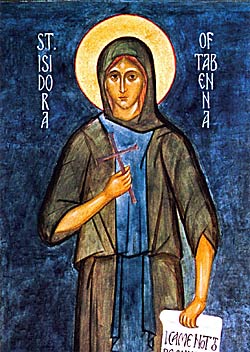Readings:
This commemoration is a 2018 addition to A Great Cloud of Witnesses.
Return to Lectionary Home Page
Webmaster: Charles Wohlers
Last updated: 10 March 2019
ISIDORA of TABENNA
FOOL FOR CHRIST, 4th c.
 Isidora of Tabenna, was a Christian nun and saint of the 4th century AD. She is considered among the earliest fools for Christ. While very little is known of Isidora’s life, she is remembered for her exemplification of the writing of St. Paul that “Whosoever of you believes that he is wise by the measure of this world, may he become a fool, so as to become truly wise.”. The story of Isidora effectively highlights the Christian ideal that recognition or glory from man is second to one’s actions being seen by God, even if that means one’s actions or even one’s self remains unknown or misunderstood. This ideal was extremely important to the early Desert Fathers and Mothers who recorded Isidora’s story.
Isidora of Tabenna, was a Christian nun and saint of the 4th century AD. She is considered among the earliest fools for Christ. While very little is known of Isidora’s life, she is remembered for her exemplification of the writing of St. Paul that “Whosoever of you believes that he is wise by the measure of this world, may he become a fool, so as to become truly wise.”. The story of Isidora effectively highlights the Christian ideal that recognition or glory from man is second to one’s actions being seen by God, even if that means one’s actions or even one’s self remains unknown or misunderstood. This ideal was extremely important to the early Desert Fathers and Mothers who recorded Isidora’s story.
Isidora’s birthdate is unknown, as is her age at the time she joined the Tabenna Monastery in Egypt. By all accounts, Isidora maintained a pattern of erratic behavior for which the other sisters at the monastery considered her "insane" or "demon possessed". Her behavior was enough to alienate her from the other sisters and due to this perception of “madness” she was treated with derision and open contempt, sometimes being beaten for her behavior.
At this time, living in the desert as a hermit or anchorite was Saint Piteroum who was well known and respected. As he was praying one day, an Angel appeared to him and asked, "Why are you proud of yourself for being religious and dwelling in a place like this? Do you want to see a woman who is more religious than you? Go to the monastery of the Tabennesi women and there you will find a woman wearing a crown on her head. She is better than you. For though she spars with so great a crowd, she has never let her heart go away from God.
Upon arriving at the monastery, Piteroum asked to see all of the sisters. As he met each one, he did not see the one to which the Angel had referred as “wearing a crown on her head”. Piteroum asked if this was in fact all of the sisters in the monastery. They replied to him that there was a “sale” or mentally afflicted member of the community still working in the kitchen. Piteroum asked to see her as well. When she was brought before Piteroum, he perceived the rag on her forehead (in some accounts he saw a crown appear above her) and he fell at her feet and said “Bless me”. Isidora fell before Piteroum in a like manner and asked “Do you bless me, Master?"
Witnessing this, the other sisters were shocked and said to Piteroum, “Father, do not let her insult you, she is sale”. Piteroum quickly replied to all by saying “You are sale. For she is Mother (Spiritual leader) both of me and you and I pray to be found worthy of her in the day of judgement”. Having heard this, all of the other sisters fell at the feet of Piteroum and began to confess the ways in which they had mistreated Isidora.
Upon Piteroum’s departure, treatment of Isidora changed dramatically within the monastery, as the sisters continued to ask her for forgiveness and began to revere Isidora as blessed. However, after a few days, unable to bear the glory and honor bestowed by the sisters, and burdened by their apologies, Isidora left the monastery. After leaving the monastery, Isidora essentially disappeared. No stories, records or texts exist that indicate where she might have traveled to, how she lived, or how she died. Most modern scholarship suggests she died no later than the year 365 AD.
- more at Wikipedia